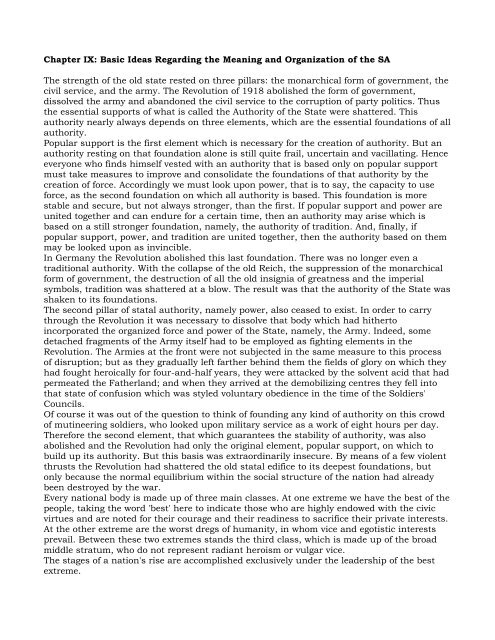Mein Kampf by Adolf Hitler
Mein Kampf by Adolf Hitler
Mein Kampf by Adolf Hitler
- TAGS
- kampf
- adolf
- hitler
- stuff2share.com
Create successful ePaper yourself
Turn your PDF publications into a flip-book with our unique Google optimized e-Paper software.
Chapter IX: Basic Ideas Regarding the Meaning and Organization of the SA<br />
The strength of the old state rested on three pillars: the monarchical form of government, the<br />
civil service, and the army. The Revolution of 1918 abolished the form of government,<br />
dissolved the army and abandoned the civil service to the corruption of party politics. Thus<br />
the essential supports of what is called the Authority of the State were shattered. This<br />
authority nearly always depends on three elements, which are the essential foundations of all<br />
authority.<br />
Popular support is the first element which is necessary for the creation of authority. But an<br />
authority resting on that foundation alone is still quite frail, uncertain and vacillating. Hence<br />
everyone who finds himself vested with an authority that is based only on popular support<br />
must take measures to improve and consolidate the foundations of that authority <strong>by</strong> the<br />
creation of force. Accordingly we must look upon power, that is to say, the capacity to use<br />
force, as the second foundation on which all authority is based. This foundation is more<br />
stable and secure, but not always stronger, than the first. If popular support and power are<br />
united together and can endure for a certain time, then an authority may arise which is<br />
based on a still stronger foundation, namely, the authority of tradition. And, finally, if<br />
popular support, power, and tradition are united together, then the authority based on them<br />
may be looked upon as invincible.<br />
In Germany the Revolution abolished this last foundation. There was no longer even a<br />
traditional authority. With the collapse of the old Reich, the suppression of the monarchical<br />
form of government, the destruction of all the old insignia of greatness and the imperial<br />
symbols, tradition was shattered at a blow. The result was that the authority of the State was<br />
shaken to its foundations.<br />
The second pillar of statal authority, namely power, also ceased to exist. In order to carry<br />
through the Revolution it was necessary to dissolve that body which had hitherto<br />
incorporated the organized force and power of the State, namely, the Army. Indeed, some<br />
detached fragments of the Army itself had to be employed as fighting elements in the<br />
Revolution. The Armies at the front were not subjected in the same measure to this process<br />
of disruption; but as they gradually left farther behind them the fields of glory on which they<br />
had fought heroically for four-and-half years, they were attacked <strong>by</strong> the solvent acid that had<br />
permeated the Fatherland; and when they arrived at the demobilizing centres they fell into<br />
that state of confusion which was styled voluntary obedience in the time of the Soldiers'<br />
Councils.<br />
Of course it was out of the question to think of founding any kind of authority on this crowd<br />
of mutineering soldiers, who looked upon military service as a work of eight hours per day.<br />
Therefore the second element, that which guarantees the stability of authority, was also<br />
abolished and the Revolution had only the original element, popular support, on which to<br />
build up its authority. But this basis was extraordinarily insecure. By means of a few violent<br />
thrusts the Revolution had shattered the old statal edifice to its deepest foundations, but<br />
only because the normal equilibrium within the social structure of the nation had already<br />
been destroyed <strong>by</strong> the war.<br />
Every national body is made up of three main classes. At one extreme we have the best of the<br />
people, taking the word 'best' here to indicate those who are highly endowed with the civic<br />
virtues and are noted for their courage and their readiness to sacrifice their private interests.<br />
At the other extreme are the worst dregs of humanity, in whom vice and egotistic interests<br />
prevail. Between these two extremes stands the third class, which is made up of the broad<br />
middle stratum, who do not represent radiant heroism or vulgar vice.<br />
The stages of a nation's rise are accomplished exclusively under the leadership of the best<br />
extreme.


